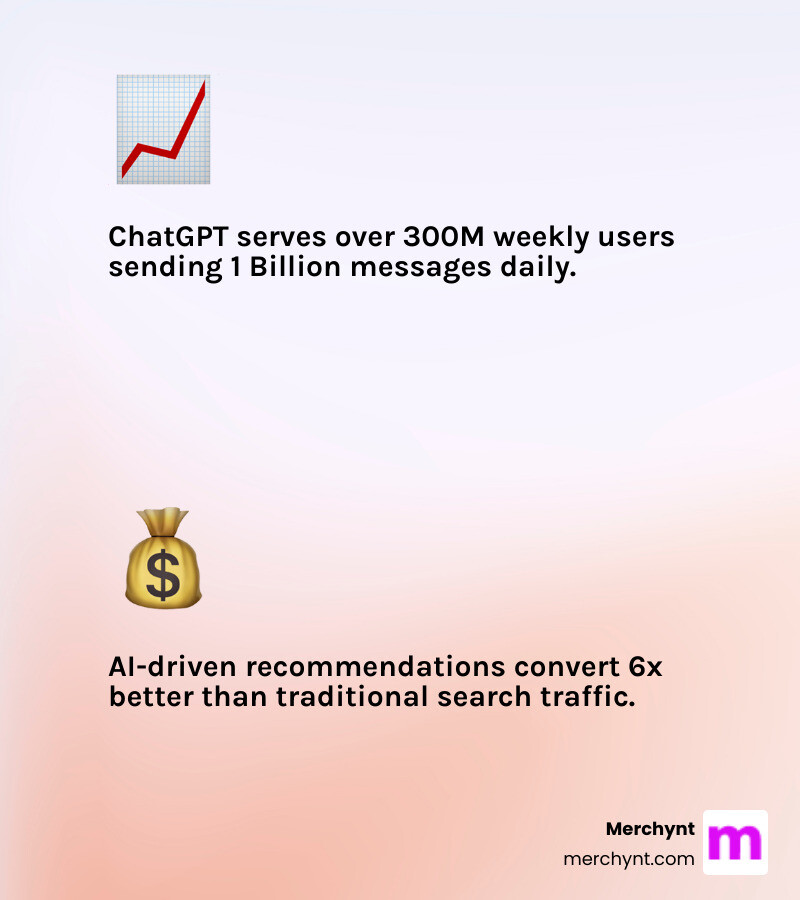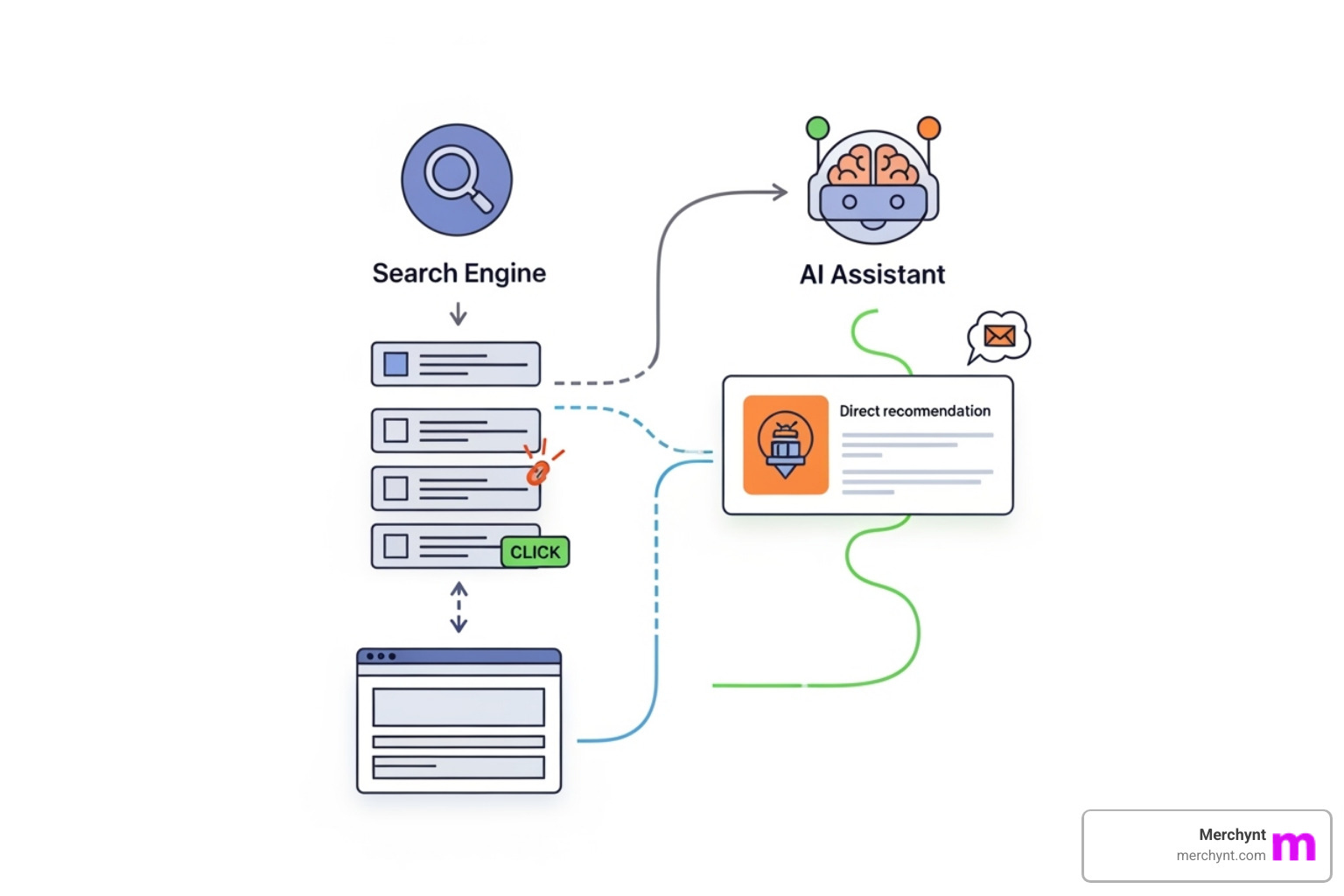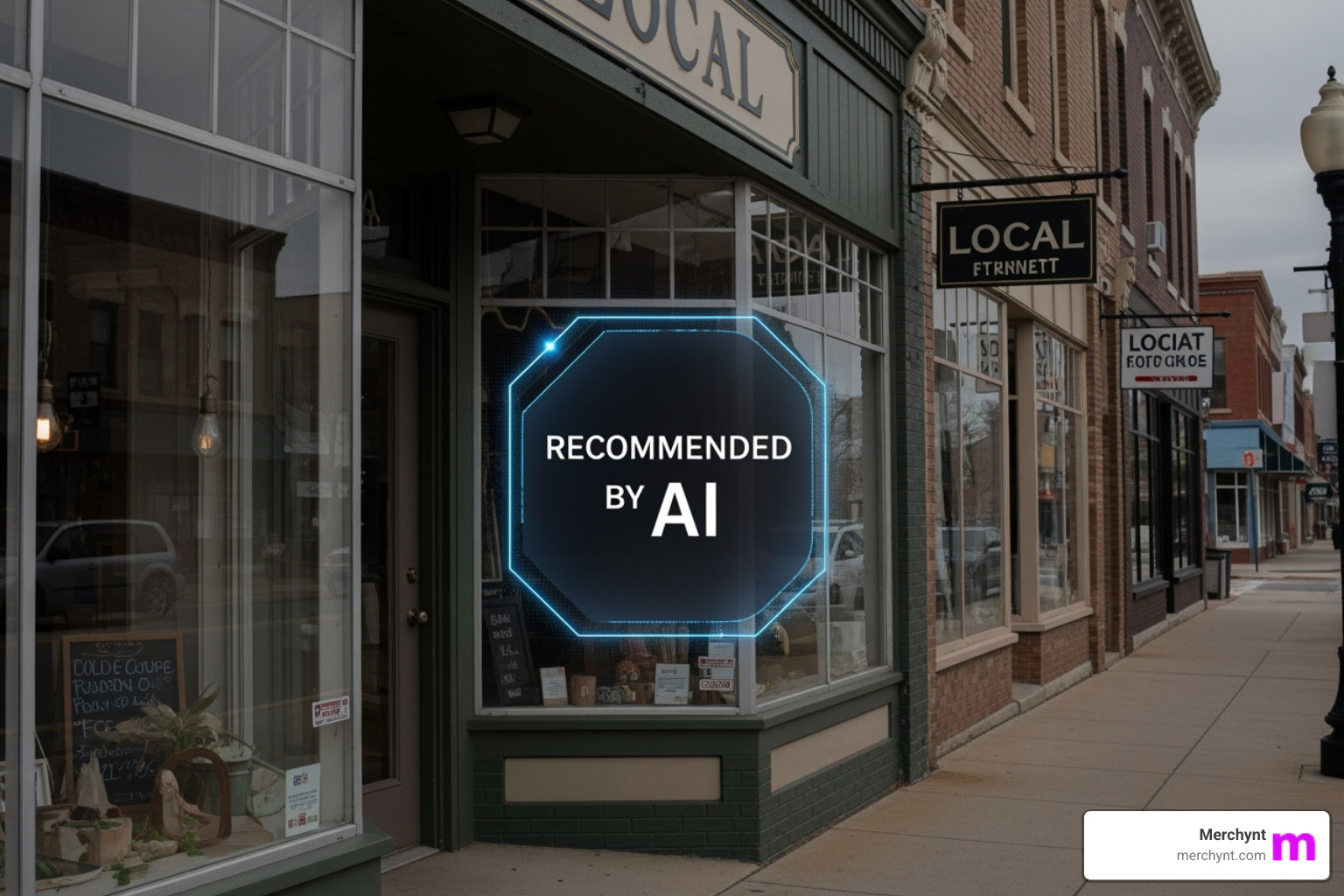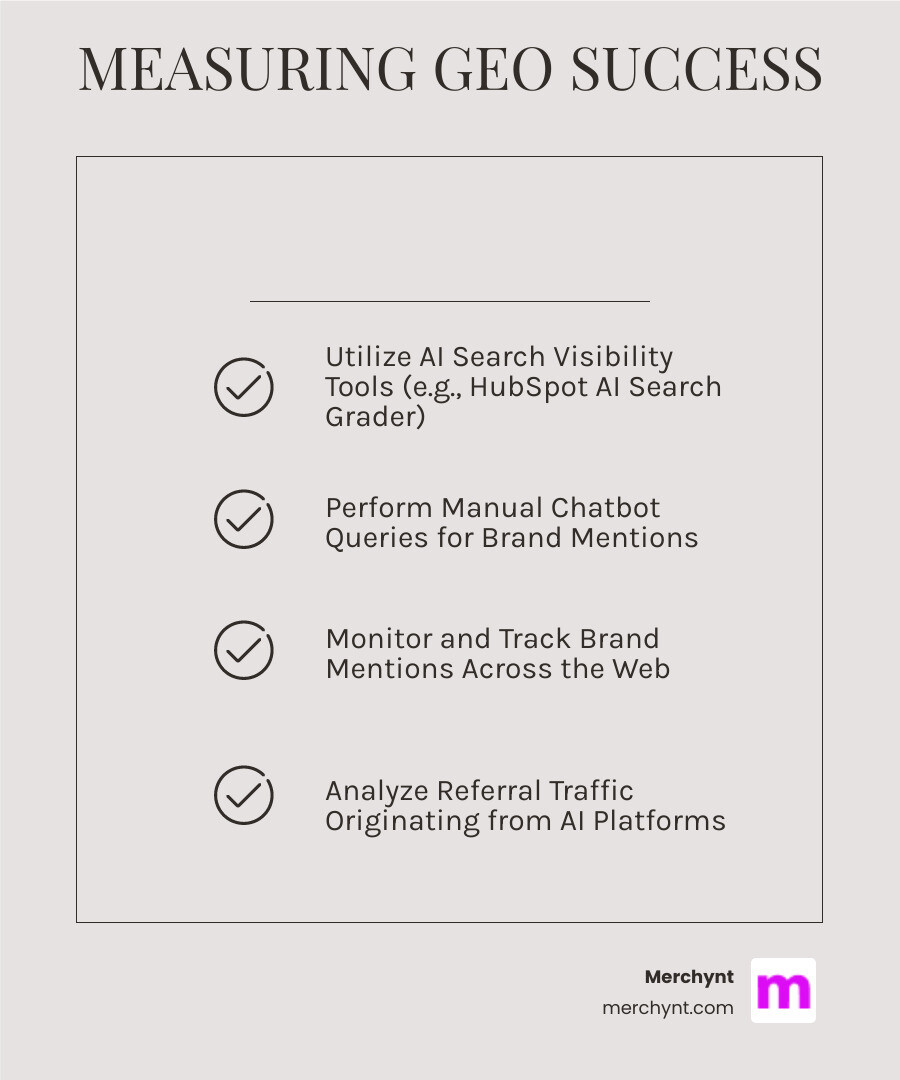
The New Frontier of Search: Why ChatGPT Is the Future of Business Findy
ChatGPT recommendation engine optimization is reshaping how customers find businesses. With over 300 million weekly users, ChatGPT is no longer just a tool; it's a primary source for direct, trusted recommendations.
Quick Answer: How to Optimize for ChatGPT Recommendations
- Build E-E-A-T signals - Demonstrate expertise, experience, authoritativeness, and trustworthiness.
- Create conversational content - Use Q&A formats, natural language, and comprehensive guides.
- Leverage structured data - Implement schema markup for better AI understanding.
- Earn third-party mentions - Get cited in authoritative publications and industry forums.
- Optimize for Bing - Since ChatGPT pulls from Bing's search index for live results.
- Gather positive reviews - Build social proof across platforms like Google, Yelp, and Reddit.
For the first time in 20 years, a significant search alternative to Google has emerged. When users ask ChatGPT for recommendations, they receive a direct answer, not a list of links. This creates a huge opportunity: traffic from AI recommendations converts six times better than traditional search traffic. However, if you're not mentioned, you're invisible to this growing audience.
While traditional SEO is still important, you now need to speak AI's language. I'm Justin Silverman, founder of Merchynt. I've helped over 10,000 businesses optimize their online presence with AI tools like Paige. Mastering chatgpt recommendation engine optimization gives early adopters a significant competitive edge.

Understanding the New Search Paradigm: GEO vs. SEO
The digital world is witnessing the birth of Generative Engine Optimization (GEO), also known as Answer Engine Optimization (AEO). It's fundamentally different from traditional SEO.
Here's the key difference: SEO gets you ranked on a results page. ChatGPT recommendation engine optimization gets your brand directly mentioned in AI's conversational responses. It's the difference between being an option versus being the recommendation. As Brooke Webber from Ninja Patches notes, "Generative engine optimization focuses on helping you appear on sites like ChatGPT and Gemini, whereas SEO helps you appear on search engines like Google and Bing."
Traffic from a ChatGPT recommendation is six times more likely to convert because users are following a trusted suggestion, not comparison shopping.

How AI Models Source and Prioritize Information
ChatGPT's recommendations come from a blend of pre-trained knowledge and real-time web searches. Its foundation is built on massive datasets like the Common Crawl dataset, which contains petabytes of web content.
However, this training data has a cutoff date. For current information, ChatGPT performs live web searches via its Bing integration, using a process called Retrieval-Augmented Generation (RAG) to find and synthesize up-to-date information. The AI also learns from user feedback loops, refining its understanding of what constitutes a quality source. Your content is being evaluated in real-time against the current web every time a user asks a relevant question.
Key Factors Influencing AI Recommendations
When ChatGPT decides what to recommend, it runs a complex quality assessment. Understanding these factors is key for chatgpt recommendation engine optimization.
- Credibility & E-E-A-T: AI prioritizes sources that demonstrate Experience, Expertise, Authoritativeness, and Trustworthiness. These are universal quality markers.
- Relevance: The AI uses semantic understanding to find content that genuinely addresses user intent. For example, mentioning a tool like Paige's automated Google Business Profile management is highly relevant to a query about local SEO help.
- Recency: Fresh, updated content signals that your information is current and reliable.
- Third-Party Mentions: Citations from authoritative sites, industry publications, and forums like Reddit act as external validation or social proof.
- User-Generated Content: Positive reviews on platforms like Google and Yelp signal trustworthiness. Businesses with review scores below 70% are rarely recommended.
The Core Pillars of ChatGPT Recommendation Engine Optimization
Success in chatgpt recommendation engine optimization is about building genuine credibility that AI models recognize. Think of ChatGPT as a smart friend who has read the entire internet; it will naturally recommend businesses that seem the most trustworthy and helpful. After helping over 10,000 businesses with AI-powered tools like Paige, I've identified four core pillars for earning AI recommendations.

Strengthen Your Foundational Trust Signals with E-E-A-T
E-E-A-T (Experience, Expertise, Authoritativeness, and Trustworthiness) is the foundation of how AI models decide who to trust. Instead of generic advice, show you've done what you're talking about (Experience). Highlight author qualifications and certifications (Expertise). Build recognition through backlinks and industry mentions (Authoritativeness). And ensure accuracy, transparency, and a professional website (Trustworthiness). As Search Engine Journal notes, E-E-A-T's importance has only grown in the AI era.
Create AI-Friendly Content for ChatGPT Recommendation Engine Optimization
Writing for AI means creating clear, helpful content that it will want to reference. Focus on these formats:
- Conversational, structured content: Write like you're explaining something to a friend, and use clear structures. Listicles and Q&A formats are goldmines for GEO because they directly answer user questions.
- How-to guides: Step-by-step solutions demonstrate expertise and solve real problems, making them go-to resources for AI.
- Data and statistics: Original research and case studies add credibility that AI models recognize.
- Content freshness: Regularly update your content to signal its relevance and reliability.
The goal is comprehensive topic coverage. Create in-depth guides on specific topics to build topical authority that AI models will recognize and cite.
Harness Social Proof and Third-Party Authority
AI models scan the entire internet to see what others say about you. This external validation is often more important than what's on your own site.
- Online reviews: Positive reviews on Google, Yelp, and other platforms are powerful signals. Businesses with review scores below 70% are rarely recommended. Tools like the ProfilePro Chrome extension can help streamline review generation.
- Reddit and Quora discussions: Authentic, helpful answers in these communities can influence AI recommendations for years.
- Authoritative citations: Mentions in high-authority sources like Wikipedia, industry blogs, and news outlets signal that your business is trustworthy.
- Social sentiment: Positive discussions on social media help AI gauge public perception of your brand.
Focusing on these pillars creates a reinforcing cycle: great content earns social proof, which builds authority and makes your optimization efforts more effective.
Advanced ChatGPT Recommendation Engine Optimization: Structured Data and Technical SEO
While content and authority are crucial, your site's technical foundation determines if AI can find and understand your information. Without it, even the best content is invisible.
Schema markup is your secret weapon for explaining your content to AI. By implementing Schema.org vocabulary, you give ChatGPT clear context. The most impactful types for chatgpt recommendation engine optimization are Organization Schema (business details), Product Schema (offerings, reviews), FAQPage Schema (Q&A content), and LocalBusiness Schema (essential for local companies). Pro tip: ensure schema data matches the visible text on your page. Use tools like Google's Rich Results Test to validate your markup.
Since ChatGPT uses Bing for real-time searches, submitting your sitemap via Bing Webmaster Tools is a direct pipeline to AI visibility. Also, ensure your website is crawlable. Check your robots.txt file to make sure you aren't blocking User-Agent: GPTBot, OpenAI's dedicated web crawler.
A logical site structure with human-readable URLs and clear internal linking helps AI steer your content efficiently. For local businesses, tools like Paige can automatically optimize your technical setup, ensuring your Google Business Profile and website work together for maximum AI visibility. Getting your technical foundation right amplifies all your other efforts.
A Practical Playbook for Local Businesses and Startups
ChatGPT recommendation engine optimization levels the playing field, allowing small businesses and startups to outmaneuver larger competitors with smart, authentic strategies.

Quick Wins for Early-Stage Startups
Use your startup agility to get noticed by AI quickly:
- Focus on niche forums: Genuinely helpful answers on Reddit and Quora become permanent breadcrumbs for AI to find your expertise.
- Create "alternatives to" content: Explain why your product is a better solution for specific use cases that established players overlook.
- Leverage help center articles: These pages often answer the exact questions people ask ChatGPT, making them prime for citation.
- Publish original research: Even simple surveys or data from your customer base can establish you as an authority that AI will reference.
Unlike traditional SEO, these tactics can help you appear in AI recommendations almost immediately.
Dominating Local AI Recommendations
Local businesses have a massive opportunity as users ask ChatGPT for local recommendations like "find me a reliable plumber." AI is the new word-of-mouth.
Online reputation management is critical. Your reviews are the primary currency AI uses to evaluate trustworthiness. The ProfilePro Chrome extension makes it easy to generate and manage the positive customer reviews that AI models look for.
To start, you need to know where you stand. The best choice is our free GBP Audit Tool by Paige, which provides an AI-powered analysis of your Google Business Profile, identifying issues that impact your local AI visibility.
Once you've identified those issues, Paige is the automated solution to fix them all. Our AI-powered SEO tool optimizes your Google Business Profile to rank you higher on Google Maps and in local search results, which directly feeds into how AI models recommend local businesses.
For a complete picture, our Heatmap Audit Tool shows where you rank in specific geographic areas, helping you fine-tune your strategy. Finally, ensure your NAP (Name, Address, Phone) information is consistent everywhere, as AI gets confused by discrepancies.
Measuring Success and Avoiding Common Pitfalls
Optimizing for AI recommendations is a new field, but you can track your progress and avoid common mistakes that hurt your chatgpt recommendation engine optimization efforts.

How to Track Your Visibility in AI Search
Several tools and techniques can help you measure your performance:
- AI search visibility tools: Services like HubSpot's AI Search Grader analyze how often your brand appears in AI responses.
- Manual testing: Regularly ask ChatGPT questions your customers would ask. Note if and how your brand is mentioned.
- Tracking brand mentions: Set up Google Alerts and monitor platforms like Reddit and Quora that AI models frequently cite.
- Referral traffic: Look for referral sources in your analytics that include "openai" or "chatgpt," indicating direct traffic from AI recommendations.
- Citation analysis: When ChatGPT cites your content, analyze which phrases it extracted to refine your content strategy.
Common Mistakes That Banish You From AI Recommendations
AI models are sophisticated at detecting corner-cutting. Avoid these common mistakes:
- Over-optimization and keyword stuffing: Unnatural language is a red flag. Write conversationally for humans, not algorithms.
- Neglecting E-E-A-T signals: Without clear markers of expertise, experience, authoritativeness, and trustworthiness, your content will be deemed incredible.
- Shallow content: AI has access to millions of sources and will always choose comprehensive, in-depth resources over surface-level articles.
- Poor site structure: If AI crawlers can't easily steer your site, they'll move on. Ensure logical navigation and clear headings.
- Ignoring negative reviews: AI pays close attention to what others say about you. Unaddressed negative sentiment can derail your efforts. Tools like our ProfilePro Chrome extension are invaluable for managing your online reputation.
The Future of Search: GEO, AI, and Your Digital Strategy
The convergence of AI and search is reshaping how customers find businesses. It's an exciting time if you know how to adapt.
Interestingly, purely AI-generated content performance struggles with chatgpt recommendation engine optimization. AI models are trained to recognize original thinking, not regurgitated machine output. This is due to a phenomenon called model collapse, where AI systems trained on AI-generated content progressively lose accuracy and diversity, as shown in research published in Nature. It's like making a photocopy of a photocopy.
This makes your human-generated content—with its real experiences and authentic insights—more valuable than ever. It's the original source material that AI craves.
The convergence of LLMs and search is happening now. Google is integrating AI overviews, and ChatGPT pulls real-time data from Bing. For local businesses, this is a golden opportunity. Tools like Paige help optimize for this new reality by ensuring your Google Business Profile is perfectly structured for AI evaluation.
Evolving digital marketing strategies must shift focus from just ranking for keywords to becoming the go-to source that AI confidently recommends. This requires building genuine authority, maintaining an impeccable reputation, and creating content that demonstrates real expertise. The question isn't if AI will change search—it already has. The question is whether you'll adapt.
Frequently Asked Questions about ChatGPT Optimization
How does ChatGPT decide which brands to recommend?
ChatGPT acts like a research assistant, synthesizing information from its vast training data and live Bing searches. For ChatGPT recommendation engine optimization to work, the AI prioritizes sources with strong E-E-A-T signals, positive reviews, and mentions from other authoritative sources. It weighs social proof heavily; for example, businesses with glowing reviews on Google and recommendations in Reddit threads are seen as more credible. Companies with review scores below 70% are rarely recommended.
How long does it take to see results from GEO?
GEO can show results much faster than traditional SEO. You might see initial mentions within a few weeks, especially if you have a solid online presence. However, for consistent brand mentions, plan for 3-4 months of dedicated effort. This includes creating quality content, building authority through third-party mentions, and gathering positive reviews. Once you gain momentum, the results create a positive feedback loop.
Does optimizing for Google SEO help with ChatGPT?
Yes, absolutely. Your traditional SEO efforts are the foundation for AI visibility. Since ChatGPT uses Bing for live searches and its training data includes top-ranking web pages, strong SEO is critical. If Google considers your content authoritative, AI models often will too. The principles of quality content, E-E-A-T, and good site structure benefit both. For local businesses, the best approach is to use our GBP Audit Tool by Paige to identify issues, and then use Paige, the automated solution, to fix them. This improves local SEO and simultaneously builds the authority signals that help ChatGPT make local recommendations.
Conclusion: Become the AI's Go-To Recommendation
The digital world has shifted. ChatGPT recommendation engine optimization is the new frontier for businesses that want to thrive in an AI-powered world. While your competitors fight over traditional rankings, you can become the brand that ChatGPT confidently recommends to millions.
We've covered the essentials: building E-E-A-T signals, creating conversational content, leveraging social proof, and implementing smart technical SEO. For local businesses, the opportunity is even greater, as AI becomes the new source for local referrals.
This is an ongoing journey that rewards a genuine commitment to being helpful and trustworthy. The businesses that adapt now will establish themselves as the authorities AI turns to again and again.
Ready to see where you stand? The best place to start is with our free, AI-powered GBP Audit Tool by Paige. It provides an instant, in-depth analysis of what's holding back your local visibility and gives you a clear roadmap.
Once you know what to fix, Paige is your fully automated solution to resolve all the issues the audit finds. It's the most advanced AI SEO tool on the market, designed to optimize your Google Business Profile and local presence so customers—and AI—can find you. The future belongs to businesses that AI trusts. Make sure yours is one of them.
About Author

